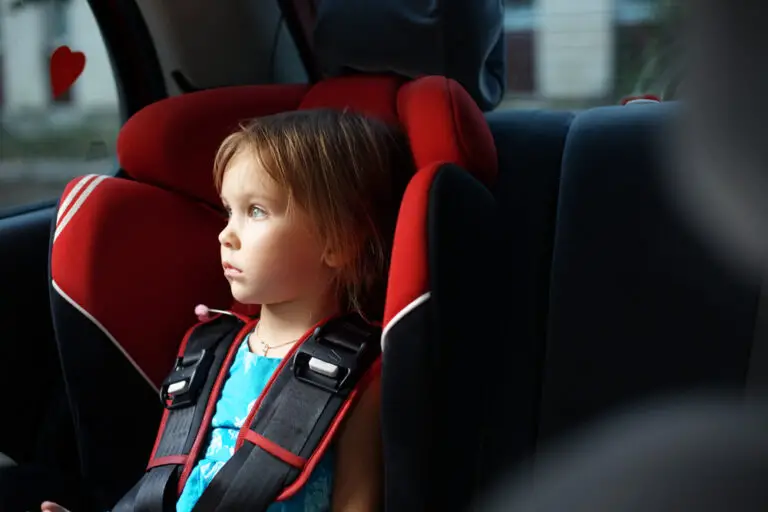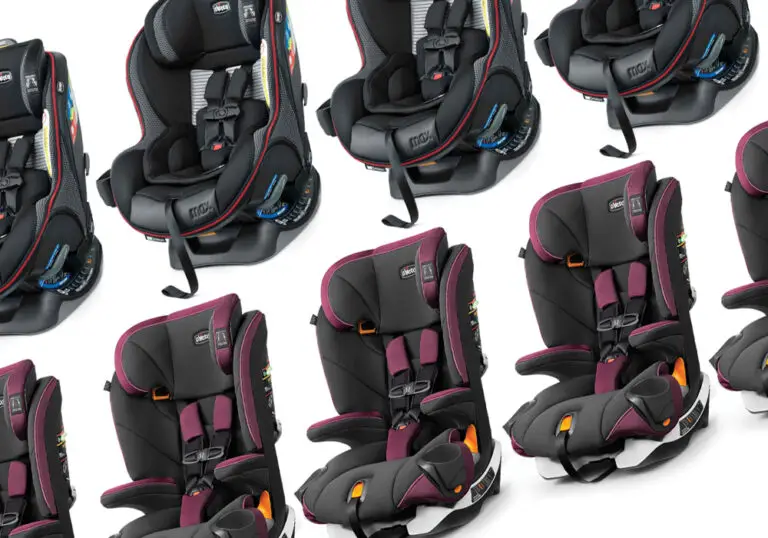New Jersey Car Seat Laws 2024 (Rear, Forward & Booster)

Under the New Jersey car seat laws, children below 8 years of age and shorter than 57 inches have to ride in the prescribed child safety restraint systems. Only school buses are exempt from these regulations. The prescribed child restraints include rear-facing, forward-facing, and booster seats. Any violation of the law is penalized.
Disclaimer: The content in this article does not, in any manner, constitute legal advice. It is solely for the purpose of providing information. The law is amended from time to time and information in this article may not always be up to date. We recommend you check the original source of the law.
- NJ Rear-Facing Seat Law
- NJ Forward-Facing Seat Law
- NJ Booster Seat Law
- NJ Child Front Seat Law
- NJ Child Seat Belt Law
- NJ Taxi Child Seat Law
- NJ Ridesharing Seat Law
- NJ Child Seat Repl. Law
- Leaving Child in Car in NJ
- Choosing a Child Seat in NJ
- Seat Installation Help in NJ
New Jersey Car Seat Laws
New Jersey Rear-Facing Car Seat Law
According to the rear-facing car seat law in New Jersey, a child less than 2 years old and weighing less than 30 pounds must be secured in an infant rear-facing seat. The seat should have a 5-point harness. (1)
A child under 4 years old and weighing less than 40 pounds can continue to ride in a rear-facing seat till they outgrow it.
The rear-facing car seat age in New Jersey is 2 years. But it is better for the child to ride rear-facing for as long as possible. Once they outgrow the upper height and weight limits prescribed by the manufacturer, they can stop using a rear-facing seat.
The driver will be fined for a violation of New Jersey rear-facing child seat law. The fine can range from $50 to $75. (2)
Age: Newborn to 2 years
Weight: Less than 30 pounds
Penalty: Minimum $50; Maximum $75
New Jersey Forward-Facing Car Seat Law
According to the forward-facing car seat law in New Jersey, a child younger than 4 years and weighing less than 40 pounds has to be secured in a forward-facing seat with a harness. (1)
Children who are less than 8 years old and shorter than 57 inches can also ride in a forward-facing seat. They should continue to ride in this seat till they reach the maximum height and weight limits recommended by the seat’s manufacturer.
The forward-facing car seat age in New Jersey is 4 years and younger. The vehicle operator is required to ensure that the child is properly restrained. They will be held responsible for any violation of New Jersey forward-facing child seat law. It carries a penalty of a minimum $50 and a maximum $75. (2)
Age: 2 to 8 years
Height: Less than 57 inches
Weight: Less than 40 pounds
Penalty: Minimum $50; Maximum $75
New Jersey Booster Seat Law
According to the child booster seat law in New Jersey, children less than 8 years of age and shorter than 57 inches, who have outgrown their forward-facing seats, can ride in a booster seat. (1) You can choose a high back or backless booster seat, depending on your requirements.
The booster seat age in New Jersey is 4 to 8 years. But the National Highway Transport Safety Administration (NHTSA) recommends keeping your child in a booster seat till they are big enough in height and weight to fit in a seat belt. A properly secured seat belt is where the lap and shoulder belts sit snugly across their thighs and shoulders, respectively.
Disobeying New Jersey booster seat requirements will result in a penalty ranging from $50 to $75. (2)
Age: 4 to 8 years
Height: Shorter than 57 inches
Penalty: Minimum $50; Maximum $75
New Jersey Child Front Seat Law
According to the child front seat law in New Jersey, a child traveling in a vehicle that has safety belts or a Lower Anchors and Tethers for Children system (LATCH) must be seated in the rear seat. (1)
f there are no rear seats, the child can sit in the front seat in an appropriate child safety seat. In the case of a rear-facing seat, the passenger-side airbag must be deactivated.
The front seat age in New Jersey is not mentioned clearly. But the American Academy of Pediatrics (AAP) recommends that children sit in the back seat till at least 13 years of age. They must be secured in an appropriate child restraint as per their height and weight requirements.
A violation of New Jersey state law will attract a penalty of a minimum $50 and a maximum $75. (2)
Age: Recommended – 13+ years
Penalty: Minimum $50; Maximum $75
New Jersey Child Seat Belt Law
According to the child seat belt law in New Jersey, all children between the ages of 8 and 18 years must wear a properly adjusted and fastened adult safety belt, whether they are in the front seat or the backseat. Those younger than 8 years but at least 57 inches in height also have to wear a seat belt. (3)
There are certain exceptions to New Jersey children’s seat belt law. It does not apply to a passenger vehicle manufactured before July 1, 1966 or one that is not required under federal law to have a seat belt. It also does not apply if the driver/passenger has a medical reason for not wearing a seatbelt. (4)
Disobeying the requirements of seat belt rules in New Jersey carries a fine of $20. (5)
Age: 8 to 18 years
Height: 57+ inches
Penalty: $20
New Jersey Taxi Child Seat Law
According to the taxi child seat law in New Jersey, taxis are required to have car seats. A child passenger must be secured according to New Jersey child seat laws. This includes having rear-facing, forward-facing and booster seats according to the child’s age. Only a school bus is exempt from this law. (1)
The child seat requirements in New Jersey vary for different age groups. Thus, an all-in-one seat is the best option for a taxi child seat in New Jersey. It can change from a rear-facing to a forward-facing and booster seat. The driver can have this one seat to meet all requirements.
Violating the law carries a fine between $50 to $75. (2) Before you board a taxi, ensure that the driver has a child seat or carry one with you.
New Jersey Ridesharing Child Seat Law
There is no express ridesharing child seat law in New Jersey. As per New Jersey car seat regulations, children below 2 years of age and weighing less than 30 pounds have to be secured in a rear-facing seat.
Those younger than 4 years and weighing less than 40 pounds should ride in a forward-facing seat with a harness till they outgrow it. Children younger than 8 years and shorter than 57 inches should ride in a booster seat. (1)
The law does not mention ridesharing services such as Uber and Lyft. Nor does it state who should provide the child seat. Hence, it is best for either the driver or the parent/caregivers to provide an appropriate car seat for the child. Not doing so will attract a fine between $50 to $75. (2)
New Jersey Child Seat Replacement Law
There is no express child seat replacement law in New Jersey. But the NHTSA recommends child seat replacement after an accident.
In case of a moderate or severe accident in New Jersey, you must immediately replace the child safety seat. It may have defects that are not easily visible and can pose a risk.
In case of a low-impact accident, there is no urgent need to replace the car seat. Such a crash is one when no passenger sustains injuries, the airbags didn’t deploy, there was no damage to the car seat and the vehicle could be driven away from the crash site.
You must also replace the car seat after it has passed its expiry date prescribed by the manufacturer or your child has outgrown it.
Leaving Child in the Car in New Jersey
There is no specific law on leaving a child in a vehicle in New Jersey. However, the AAP has highlighted the dangers of leaving a child unattended in a vehicle. They may suffer heatstroke, set the vehicle in motion, or get kidnapped or trapped in the vehicle.
Many children have suffered from heat stroke inside vehicles. The temperature inside the vehicle can rise quickly. Since children’s bodies heat up faster than adults, it can cause severe brain injury or even death.
The New Jersey Department of Children and Families warns against leaving a child in the car in New Jersey even for a minute. If the child is injured, the adult responsible for the act can face serious legal consequences such as child neglect.
Choosing a Child Car Seat in New Jersey
You can refer to NHTSA recommendations when choosing a car seat in New Jersey. Children below 2 years old should ride in a rear-facing seat. For toddlers and young children, a forward-facing seat with a harness is the best car seat to use in New Jersey.
Once children outgrow the forward-facing seat, they should travel in a booster seat. You can either choose a backless or a high-back booster seat. A versatile all-in-one seat may be the best booster seat to use in New Jersey.
Ensure that you buy the correct child passenger safety seats in New Jersey that comply with the car seat law.
Car Seat Installation Help in New Jersey
Installing the car seat can be a complex task if you have not done it previously. You have to refer to the vehicle and car seat manuals and decipher the LATCH system.
Even if you have installed it, you should get it inspected by a certified child passenger safety (CPS) technician. New Jersey has various stations where you can get your car seat installed/inspected. Some of them are:
- Mahwah Police Department
- Burlington Township Police Department
- Cooper University Health Care
- Deer Park Station, Cherry Hill Township
- Jersey City Medical Center
For a complete list of CPS technicians, check the Department of Law & Public Safety website.
New Jersey Car Seat Safety Resources
For more information on car seat laws in New Jersey and other resources, you can refer to the following:
- New Jersey Department of Law & Public Safety
- New Jersey Division of Highway Traffic Safety
- Safe Kids New Jersey: A coalition of Safe Kids Worldwide, it is led by Central Jersey Family Health Consortium. It conducts car seat checks and implements programs that encourage child safety.
- Camden County: Official website of the Government of Camden County, New Jersey
- Gloucester County: Official website of the Government of Gloucester County, New Jersey
- Atlantic Health System, a leading health organization in New Jersey.
- Wall Township Police
FAQ
How long should a child ride in a rear-facing car seat in New Jersey?
Under the law, a child weighing less than 30 pounds should ride in a rear-facing car seat in the backseat till the age of 2 years.
Can you put a rear-facing car seat in the front seat in New Jersey?
No. A rear-facing car seat should be placed in the backseat. It can be placed in the front seat— with the airbag deactivated— only if the vehicle does not have a backseat.
Can you put a rear-facing car seat in the middle rear seat in New Jersey?
Yes, you can put a rear-facing car seat in the middle seat if your vehicle has lower anchors for the middle seat that can hold the car seat tightly.
When can a baby face forward in a car seat in New Jersey?
A baby can face forward once they turn 2 years old and weigh less than 40 pounds. They can also face forward once they outgrow their rear-facing seat.
How old for a booster seat in New Jersey?
A child less than 8 years old and shorter than 57 inches can ride in a booster seat if they have outgrown their forward-facing seat.
When to use a backless booster seat in New Jersey?
You can use a backless booster seat only if your vehicle seat has a head rest and the child’s ears are not higher than the seat back.
When can a child sit in the front seat in New Jersey?
The law mandates that children sit in the backseat. They can sit in the front seat only if the vehicle does not have a backseat.
When can a child sit in the front seat with a booster in New Jersey?
Children in a booster seat should ride in the back seat. But if there is no backseat, they can sit in the front seat with a booster.
When can a child stop using a booster seat in New Jersey?
A child can stop using a booster seat once they turn 8 or are at least 57 inches tall. But they should use a booster till they are big enough for the seat belt.
When to switch from 5 point harness to a seat belt in New Jersey?
A child 8 years old and at least 57 inches tall can wear a seat belt. But they should ideally switch when they outgrow the 5-point harness.
When can a child use a regular seat belt in New Jersey?
A child can use a regular seat belt in New Jersey once they turn 8 years old or reach at least 57 inches in height.
Do you need a car seat in a taxi in New Jersey?
Yes, taxis are required to have a car seat. The driver is responsible for ensuring that the child is properly secured in an appropriate car seat.
Do you need a car seat in a Uber in New Jersey?
The law is unclear on this issue. But either the caregiver or the driver should provide an appropriate car seat to ensure the child’s safety.
Do you need a car seat in a Lyft in New Jersey?
The law is not clear on this issue. But either the caregiver or the driver should provide an appropriate car seat to ensure the child’s safety.

Rishima Rawat
Rishima Rawat is a lawyer and legal writer with over six years of writing and legal experience. She earned her LLB degree from the West Bengal National University of Juridical Sciences, Kolkata. With a passion for child safety, she’s written extensively about the U.S. car seat laws in ParentingMode. She collaborates with businesses and law firms globally, enhancing their online content. Her insights are also published in legal journals like RGNUL, NLIU, and RMLNLU Law Review. Committed to the cause of education, she has volunteered with IDIA, which helps underprivileged children in India to access legal education. She has also worked with Enhelion Knowledge Ventures, a leading legal ed-tech platform in India that provides students with affordable courses in law. Fluent in English and Hindi with elementary proficiency in Spanish, Rishima combines her legal expertise with a dedication to child safety.






